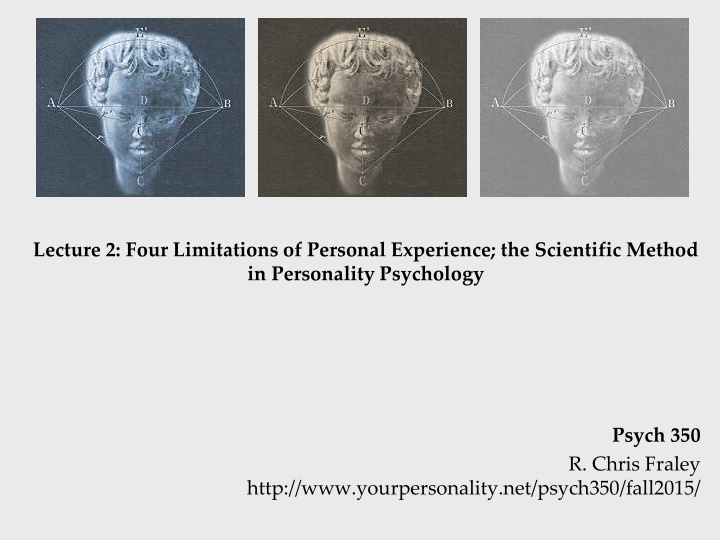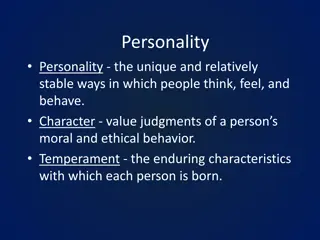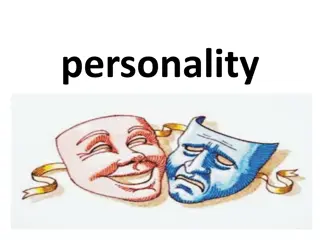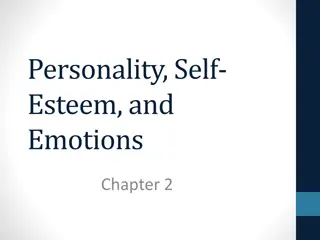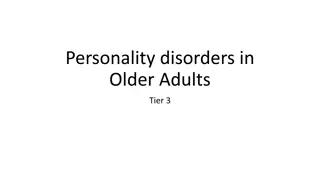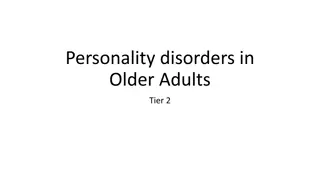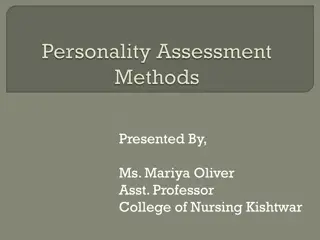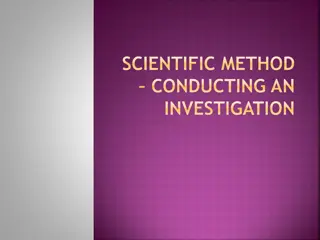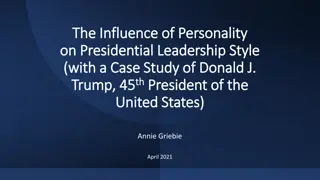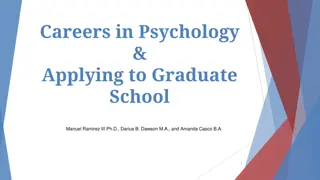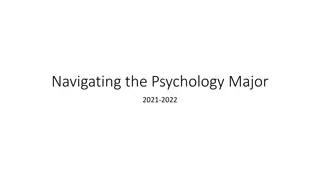The Importance of the Scientific Method in Personality Psychology
Understanding personality requires moving beyond personal experiences and subjective beliefs. This lecture emphasizes the limitations of personal experience and the necessity of the scientific method in studying personality. By examining the methods and themes of psychology, we uncover the fundamental reasons why relying solely on personal experience can hinder our understanding of human behavior. An interactive class exercise involving judgments about a person named Josh further illustrates the challenges of drawing accurate conclusions about personality traits.
Download Presentation

Please find below an Image/Link to download the presentation.
The content on the website is provided AS IS for your information and personal use only. It may not be sold, licensed, or shared on other websites without obtaining consent from the author.If you encounter any issues during the download, it is possible that the publisher has removed the file from their server.
You are allowed to download the files provided on this website for personal or commercial use, subject to the condition that they are used lawfully. All files are the property of their respective owners.
The content on the website is provided AS IS for your information and personal use only. It may not be sold, licensed, or shared on other websites without obtaining consent from the author.
E N D
Presentation Transcript
Lecture 2: Four Limitations of Personal Experience; the Scientific Method in Personality Psychology Psych 350 R. Chris Fraley http://www.yourpersonality.net/psych350/fall2015/
Psychology the methods of psychology the themes of psychology Natural Science Psychology, like the humanities, is concerned with fundamental issues concerning human experience. However, psychologists use the methods of the natural sciences to learn about psychological phenomena. Philosophy & Humanities
Why Do We Need the Scientific Method in Order to Study Personality? The methods we tend to use are subject to severe limitations. We tend to rely upon personal experience and authority in constructing our beliefs about the world. What are the limitations of these methods for understanding the world?
Class Exercise In the following exercise, I will ask you to make judgments about the personality of a person named Josh. I will present you with a number of brief descriptions of Josh, taken from statements made by Josh and some of his friends. After you have had a chance to read each statement, I ll ask you some questions about Josh. Before we begin, we need two groups. Group 1 = Heads (H) and Group 2 = Tails (T)
Group Heads Your goal is to answer the following question: Is Josh an extraverted (i.e., social, high-energy, outward-focused) individual?
Group Heads: Close your eyes Group Tails: Open you eyes
Group Tails Your goal is to answer the following question: Do you think Josh is a relatively intelligent person?
Characteristics of Josh Josh studies had and takes his courses seriously. Josh likes to hang out with his friends at the local pub. Cherry Garcia is Josh s favorite kind of ice cream. Josh is in his fourth year of college at UIUC. Josh spends a lot of time on Facebook. Josh can be shy when he is meeting someone for the first time. Josh is an early bird, and often gets up at dawn. Josh enjoys meeting and interacting with new people. Josh loves Thai food. Josh claims he spends too much money buying music.
Now Take 60 seconds to write down as many of the statements as you can recall.
Now One last question: Would you describe Josh as an extravert (i.e., someone who is relatively social, outgoing, and energetic)? Answer Yes or No
Four Limitations of Personal Experience 1. The Confirmation Bias and the Discounting Problem. We tend to seek out information that is consistent with our expectations. Moreover, sometimes we discount information that is inconsistent with those expectations.
Four Limitations of Personal Experience This class exercise generally demonstrates that people who are trying to answer the question Is Josh Extraverted? are more likely to conclude that Josh is extraverted. How many people in the Heads group said Yes? compared to the Tails group? In the process, information that is inconsistent with that judgment (i.e., Josh can be shy when he is meeting someone for the first time ) is sometimes ignored or forgotten. How many people in the Heads group recalled this item?
Four Limitations of Personal Experience 2. The Limited Data Problem. We tend to make inferences on the basis of very little information.
Four Limitations of Personal Experience In psychology, this strategy is problematic because behavior is probabilistic and multi-determined. Even highly extraverted or sociable people behave shyly in some circumstances. Thus, when we draw inferences based on a limited amount of information, we are impairing our ability to make the correct assessment.
The Dangers of CHC 1. 2. More than 98 percent of convicted felons have tested positive for CHC. 99.7% of the people involved in auto accidents used a substance containing CHC within 6 months preceding the accident. 93.1% of juvenile delinquents come from neighborhoods where CHC is used frequently. 3.
The Dangers of Bread 1. 2. More than 98 percent of convicted felons are bread users. 99.7% of the people involved in auto accidents ate bread within 6 months preceding the accident. 93.1% of juvenile delinquents came from homes where bread is served frequently. 3.
Four Limitations of Personal Experience 3. TheBaserate/Comparison Group Problem. We tend to overlook the fact that inferences about associations require some kind of comparison or standard. A related issue: The Big Numbers Problem. We assume that big (or small) percentages are important, even when appropriate comparison data are not available.
Example Does eating chicken soup decrease cold severity? What if we were to learn that 7 of 10 (70%) of people with a cold who had chicken soup started to feel better after 5 days?
Example That Big Number is inadequate. Why? Maybe 7 out of 10 (70%) people with a cold who didn t have chicken soup started to feel better after 5 days too.
Chicken Soup No Yes 7 7 Feel Better Effect 3 3 Feel Same or Worse 7/10 felt better 7/10 felt better
Chicken Soup No Yes 5 7 Feel Better Effect 5 3 Feel Same or Worse 5/10 felt better 7/10 felt better
Four Limitations of Personal Experience 4. The Pleasant Truth Problem. We tend to believe an idea is true if the idea makes us feel good.
How do these propositions feel to you? Peoples financial success in life is largely a function of the social status of the families they are born into and not their hard work or education per se. As a parent, how you rear your children plays virtually no role in whether your children grow up to become criminals or law-abiding citizens. Our conscious existence ends with physical death. Our thoughts, emotions, personality, and sense of self can be changed by simply altering the biochemistry of the body. Morality and altruism evolved in people via the process of natural selection. There is no beyond the obvious symbolism in our dreams.
Reality False True Pleasant Falsehoods Pleasant Truths Feels Good Feeling Unpleasant Falsehoods Unpleasant Truths Feels Bad
What we tend to believe Reality False True Pleasant Falsehoods Pleasant Truths Feels Good Feeling Unpleasant Falsehoods Unpleasant Truths Feels Bad
What we need to believe to be correct Reality False True Pleasant Falsehoods Pleasant Truths Feels Good Feeling Unpleasant Falsehoods Unpleasant Truths Feels Bad
Interim Summary To summarize: The way people tend to gather information is not systematic we tend to seek information that is consistent with our beliefs and ignore inconsistent information we tend to base our inferences on little information we re not attentive to base rates and comparisons we tend to assume that propositions that feel wrong to us are invalid
Why are these limitations? In conjunction, these factors can lead to two problems for developing an accurate understanding of human personality. First, these factors can lead us to the wrong answer. Second, the process itself is not self-correcting.
1. The Wrong Answer As we demonstrated in the Josh exercise, people who were seeking to answer different questions recalled different kinds of information about Josh. People who were attempting to determine whether Josh was extraverted were more likely to conclude that he was compared to people who were not evaluating his extraversion explicitly.
2. Why the Process is not Self-correcting The confirmation bias helps to ensure that, once an expectation or theory has been developed, the belief will be self- perpetuating. Is Josh extraverted? We then recall/notice extraverted- consistent information better, and fail to recall/notice introverted information We conclude that Josh is extraverted
What we want: methods that are more likely to lead us to the right answer a process for understanding the world that will enable us to correct the inevitable mistakes that we will make
The Scientific Method The scientific method is a way of dealing with these concerns. Science is theprocess of constructing, testing, and refining theories about natural phenomena though the use of systematic empirical observation.
Systematic By systematic, I mean that that all information counts, regardless of whether it is consistent or inconsistent with our assumptions or how it makes us feel. Moreover, by systematic I mean attending to base rates, collecting a sufficient amount of information, recognizing and correcting for potential biases. In short, trying to be as true as possible to what really happens in the world.
How is the process self-correcting? theory about how something works generating predictions testing: comparing the observations with the theory (what would the theory lead you to observe?) systematic empirical observations
How is the process self-correcting? theory about how something works generating predictions testing: comparing the observations with the theory Coffee makes you happy (what would the theory lead you to observe?) systematic empirical observations
How is the process self-correcting? theory about how something works generating predictions testing: comparing the observations with the theory People who drink coffee should be happy (what would the theory lead you to observe? What would it lead you to not observe?) systematic empirical observations
How is the process self-correcting? theory about how something works People who drink coffee should be more happy compared to people who do not generating predictions testing: comparing the observations with the theory (what would the theory lead you to observe?) ensures that inconsistent observations will be recorded (think about 2x2) systematic empirical observations
Happy Not Happy Coffee No Coffee
How is the process self-correcting? theory about how something works generating predictions testing: comparing the observations with the theory ensures that inconsistent observations will be counted against the theory (what would the theory lead you to observe?) systematic empirical observations
Happy Not Happy Coffee 10 consistent 1 inconsistent No Coffee 1 inconsistent 8 consistent
How is the process self-correcting? theory about how something works generating predictions testing: comparing the observations with the theory theory is revised in light of the tests, and, hopefully, becomes more accurate (what would the theory lead you to observe?) systematic empirical observations
Two caveats concerning science First, science is a method a way of collecting and evaluating data that values being systematic above all else. Science is not a topic area.
Two caveats concerning science Second, just because something is called a science doesn t mean that it is scientific in the way we ve described.
Science and Pseudo-science There are tons of nonscientific self-help books in the world, and these are featured predominantly in the psychology section of bookstores. There are over 400 distinct kinds of psychotherapy (including equine therapy). Experts from psychology and business schools are regularly featured in television shows, podcasts, op-eds. Subliminal recordings are readily available to improve your memory or to help you lose weight.
Science and Pseudo-science In short, psychological knowledge, like many things in the world, can be and is sold to the public. Why is this a problem for a new generation of psychology majors?
Why is this a problem for a new generation of psychology majors? Very few of these purveyors of psychological knowledge have training in or an appreciation for the scientific method. How do we know whether their ideas are correct or whether their products work?
Example: Subliminal Recordings Subliminal recordings contain recordings that are designed to help you achieve certain goals (e.g., lose weight, increase your confidence, quit smoking). Typically, there are two tracks on these recordings. One contains peaceful, soothing music. The other contains a spoken message that is recorded at a low volume. These messages are typically too quiet for you to detect consciously ( subliminal ).
Do they work? People who create and sell these recordings presumably do so because these recordings actually help people. What kind of evidence is there that these recordings work?
